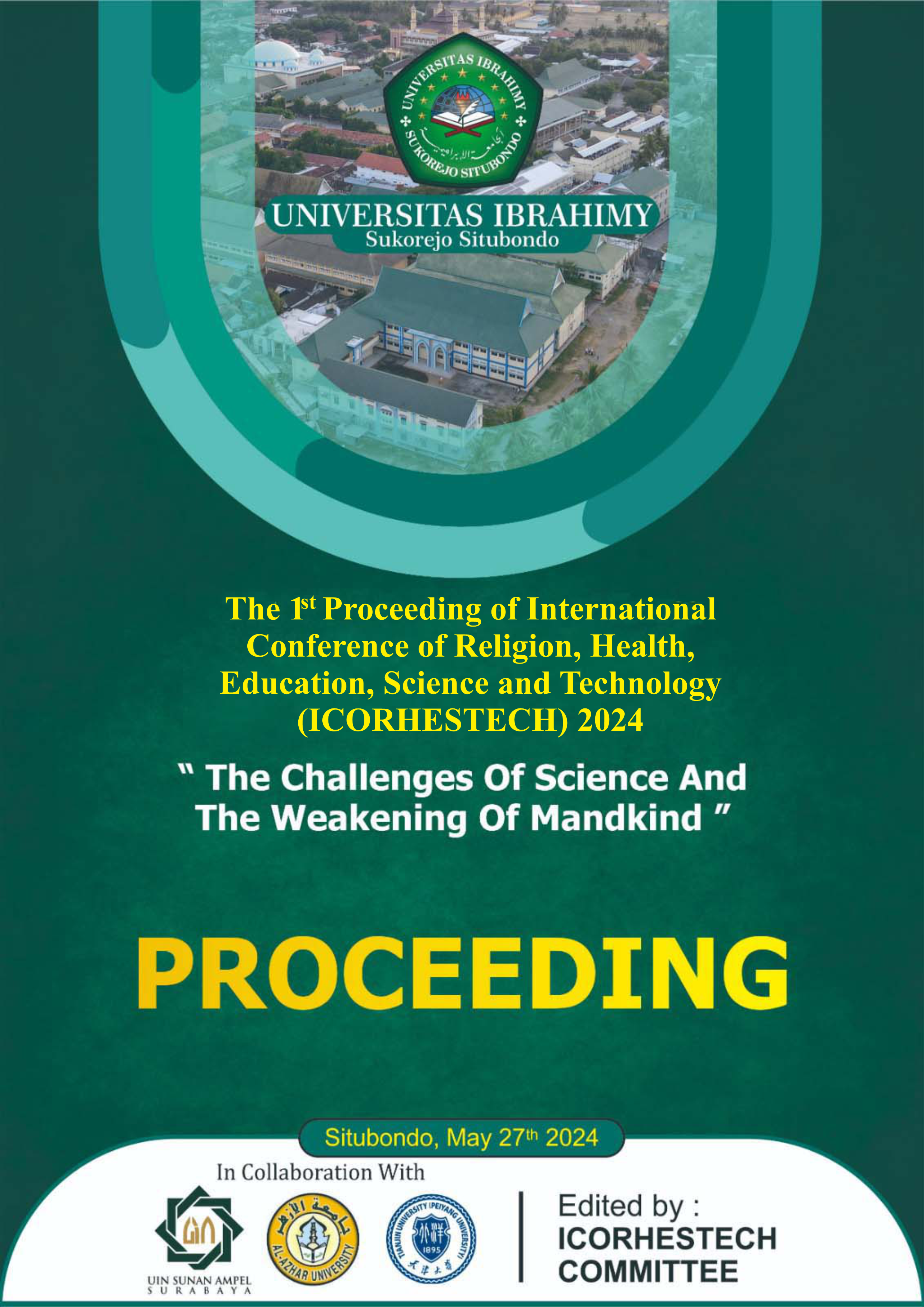The Influence of Artificial Intelligence on Traditional Sorogan and Bandongan Learning Methods in Arabic
DOI:
https://doi.org/10.35316/icorhestech.v1i1.5686Kata Kunci:
education, technology, methodsAbstrak
Current learning models have changed a lot along with the times. This proves that developments in the world of education are also changing. The development of digital technology such as artificial intelligence has changed the educational landscape, including in the context of Arabic language learning. Traditional methods of learning such as Sorogan and Bandongan have long been the dominant approach to learning Arabic in various educational settings. However, with the advancement of technology and the penetration of artificial intelligence in education, questions arise about the relevance and urgency of these traditional methods. This research aims to explore the influence of artificial intelligence on the importance of traditional methods of learning Sorogan and Bandongan in learning Arabic. The research was conducted using a literature review. Artificial intelligence has enabled the development of intelligent and adaptive learning platforms that can tailor learning to individual needs. In addition, digital applications in language learning have provided widespread access to interactive and personalized learning resources. Nevertheless, this research also highlights the importance of maintaining traditional methods such as Sorogan and Bandongan in the context of Arabic language learning. This traditional method not only reflects cultural heritage and social values, but also offers an in-depth learning experience in understanding classical texts and contextualizing Arabic in everyday life.
Referensi
Aminuriyah, S. (2022). Pembelajaran Berdifferensiasi: Meningkatkan Kreatifitas Peserta Didik. Jurnal Mitra Swara Ganesha, 9(2), 89-100.
Arifiah, D. A. (2021). Solusi Terhadap Problematika Pendidikan Dalam Pembelajaran di Pesantren Pada Era Globalisasi. Jurnal Pendidikan, 9(2), 36-43. https://doi.org/10.36232/pendidikan.v9i2.1110.
Baharuddin, B., Amin, M., Thohir, L., & Wardana, L. A. (2021). Penerapan Teori Terjemahan pada Editing Hasil Terjemahan Google Translate pada Teks Akademik oleh Mahasiswa Universitas Mataram. Jurnal Ilmiah Profesi Pendidikan, 6(4), 816-824. https://doi.org/10.29303/jipp.v6i4.390.
Fahraini, S., & Almaliki, M. F. (2023, September). Analysis of Arabic against The Use of Artificial Intelligence (AI) through Tashkeel (Automatic Harokat) Application to Increase Maharah Qiraah. In International Conference on Education (pp. 64-77).
Fiqih, M. A. (2022). Peran Pesantren dalam Menjaga Tradisi-Budaya dan Moral Bangsa. PANDAWA: Jurnal Pendidikan dan Dakwah, 4(1), 42-65.
Fiantika, F., Wasil, M., Jumiyati, S. R. I., Honesti, L., Wahyuni, S. R. I., Mouw, E., ... & Ambarwati, K. (2022). Metodologi Penelitian Kualitatif. Sumatra Barat: PT. Global Eksekutif Teknologi.
Harahap, L., & Zainuddin, D. (2023). Model Pembelajaran Kitab Al-Jurumiyah di Pondok Pesantren. Journal on Education, 5(3), 9990-9999. https://doi.org/10.31004/joe.v5i3.1879.
Ikhsanuddin, M., Anshory, I., & Abbas, N. (2023). Implementation of Yellow Book Learning with Pegon Arabic at the Roudhotut Tholibin Ulya Susukan Islamic Boarding School, Semarang Regency. JPGENUS: Jurnal Pendidikan Generasi Nusantara, 1(2), 79-90. https://doi.org/10.61787/ektkae74.
Irawan, C. M. (2023, August). Kurikulum Merdeka dan Pengembangan Perangkat Pembelajaran sebagai Solusi Menjawab Tantangan Sosial dan Keterampilan Abad-21. In Prosiding Seminar Nasional Pendidikan Non Formal (Vol. 1).
Kamal, F. (2020). Model Pembelajaran Sorogan dan Bandongan Dalam Tradisi Pondok Pesantren. Paramurobi: Jurnal Pendidikan Agama Islam, 3(2), 15-26. https://doi.org/10.32699/paramurobi.v3i2.1572.
Karim, B. A. (2020). Strategi Pembelajaran Kitab Kuning (Transformasi Penguatan Sistem Subkultur Pondok Pesantren Indonesia).
Manasiq, G. Z. A. S. (2022). Evolusi Konsep Pembelajaran Bahasa Arab: Tinjauan Sistematis terhadap Orientasi Pembelajaran Klasik dan Kontemporer. Maharot: Journal of Islamic Education, 6(1), 86-94. 10.28944/maharot.v6i1.1515.
Nurullawasepa, M., Mandani, N. Z., Adawiyah, R., Al Ayyubi, S., & Abdillah, A. A. (2023). AI (Artificial Intelligence) dalam penerjemahan teks Bahasa Arab. SENRIABDI, 141-157.
Putri, A. N., & Hasan, Moh. A. K. (2023). Application of artificial intelligence as a medium of learning Arabic the Society 5.0 Era. Tarling: Journal of Languange Education, 7(1), 69-80. https://doi.org/10.24090/tarling.v7i1.8501.
Ruhmadi, A., & Al Farisi, M. Z. (2023). Analisis Kesalahan Morfologi Penerjemahan Arab–Indonesia pada ChatGPT. Aphorisme: Journal of Arabic Language, Literature, and Education, 4(1), 55-75. https://doi.org/10.37680/aphorisme.v4i1.3148.
Simon, A. S. (2023). Prospek Pembelajaran Bahasa Arab di Era Generative Artificial Intelligence. Assuthur: Jurnal Pendidikan Bahasa Arab, 2(2), 49-58. https://doi.org/10.58194/as.v2i2.1306.
Suharmawan, W. (2023). Pemanfaatan Chat GPT dalam dunia pendidikan. Education Journal: Journal Educational Research and Development, 7(2), 158-166. https://doi.org/10.31537/ej.v7i2.1248.
Syagif, A. (2022). Paradigma Pembelajaran Bahasa Arab Di Era Society 5.0. FiTUA: Jurnal Studi Islam, 3(2), 134-144. https://doi.org/10.47625/fitua.v3i2.407.
Syam, M. N., Isnaini, R. L., Rohmah, L., & Sa'adah, S. N. (2023). The Analysis of Google Translate Translation Error From Indonesian To Arabic And Tips For Using It/Analisis Kesalahan Terjemahan Google Bahasa Indonesia-Arab dan Tips Penggunaannya. Ijaz Arabi Journal of Arabic Learning, 6(1). https://doi.org/10.18860/ijazarabi.v6i1.16299.
Widyawati, E. (2018). Penerapan Metode Srorogan dalam Pembelajaran Kitab Kuning di Pondok Pesantren Roudlotul Banaat Banaran Tunglur Badas Kediri. (Doctoral dissertation, IAIN Kediri).
Yustitia, V., Azwar, I., Inayah, S., Nurlela, L., Kania, N., Kusumaningrum, B., Prasetyaningrum, D. I., Kau, M. S., Lestari, I., Permana, R., Khaerani, & Genisa, M. U. (2024). Pendidikan di Era Digital. Edupedia Publisher.
Zein, A. (2023). Dampak Penggunaan ChatGPT pada Dunia Pendidikan. Jurnal Informatika Utama, 1(2), 19-24. https://doi.org/10.55903/jitu.v1i2.151.
Unduhan
Diterbitkan
Cara Mengutip
Terbitan
Bagian
Lisensi








